2014高考英语全国I卷听力试题及录音原文(音频下载+参考答案)
- 格式:doc
- 大小:33.04 KB
- 文档页数:4
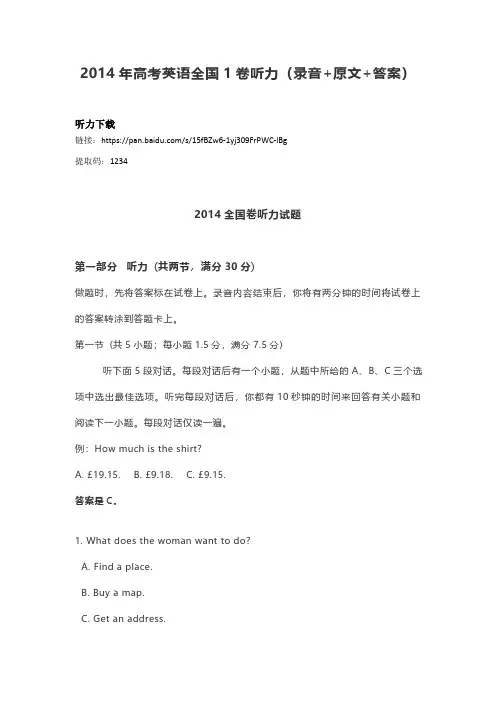
2014年高考英语全国1卷听力(录音+原文+答案)听力下载链接:https:///s/15fBZw6-1yj309FrPWC-lBg提取码:12342014全国卷听力试题第一部分听力(共两节,满分30分)做题时,先将答案标在试卷上。
录音内容结束后,你将有两分钟的时间将试卷上的答案转涂到答题卡上。
第一节(共5小题;每小题1.5分,满分7.5分)听下面5段对话。
每段对话后有一个小题,从题中所给的A、B、C三个选项中选出最佳选项。
听完每段对话后,你都有10秒钟的时间来回答有关小题和阅读下一小题。
每段对话仅读一遍。
例:How much is the shirt?A. £19.15.B. £9.18.C. £9.15.答案是C。
1. What does the woman want to do?A. Find a place.B. Buy a map.C. Get an address.2. What will the man do for the woman?A. Repair her car.B. Give her a ride.C. Pick up her aunt.3. Who might Mr. Peterson be?A. A new professor.B. A department head.C. A company director.4. What does the man think of the book?A. Quite difficult.B. Very interesting.C. Too simple.5. What are the speakers talking about?A. Weather.B. Clothes.C. News.第二节(共15小题,每小题1.5分,满分22.5分)听下面5段对话或独白。
每段对话或独白后有几个小题,从题中所给的A、B、C三个选项中选出最佳选项。
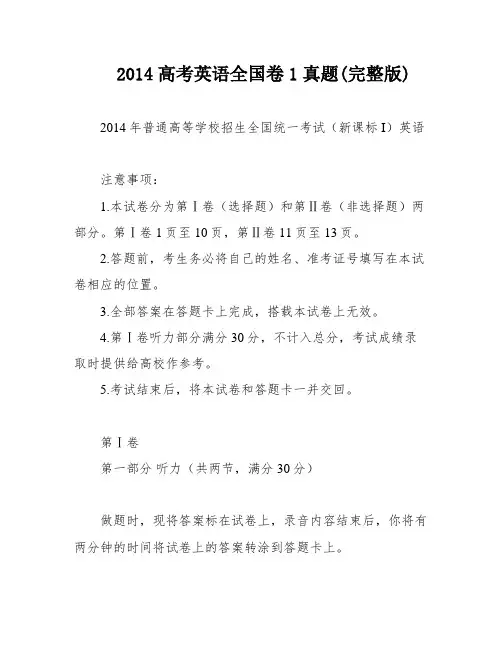
2014高考英语全国卷1真题(完整版)2014年普通高等学校招生全国统一考试(新课标I)英语注意事项:1.本试卷分为第Ⅰ卷(选择题)和第Ⅱ卷(非选择题)两部分。
第Ⅰ卷1页至10页,第Ⅱ卷11页至13页。
2.答题前,考生务必将自己的姓名、准考证号填写在本试卷相应的位置。
3.全部答案在答题卡上完成,搭载本试卷上无效。
4.第Ⅰ卷听力部分满分30分,不计入总分,考试成绩录取时提供给高校作参考。
5.考试结束后,将本试卷和答题卡一并交回。
第Ⅰ卷第一部分听力(共两节,满分30分)做题时,现将答案标在试卷上,录音内容结束后,你将有两分钟的时间将试卷上的答案转涂到答题卡上。
第一节(共5小题;每小题1.5分,满分7.5分)听下面5段对话,每段对话后有一个小题。
从题中所给的A、B、C三个选项中选出最佳选项,并标在试卷的相应位置。
听完每段对话后,你都有10秒钟的时间来回答有关小题和阅读下一小题。
每段对话仅读一遍。
1.What does the woman want to do?A。
Find a placeB。
Buy a mapC。
Get an address2.What will the man do for the woman?A。
Repair her carB。
Give her a rideC。
Pick up an aunt3.Who might Mr。
Peterson be?A。
New professorB。
A department headXXX director4.What does the man think of the book?A。
Quite differentB。
Very interestingC。
Too simple5.What are the XXX?A。
XXXB。
ClothesC。
News第二节(共15小题;每小题1.5分,满分22.5分)听下面5段对话。
每段对话或独白后有几个小题,从题中所给的A、B、C三个选项中选出最佳选项,并标在试卷的相应位置。
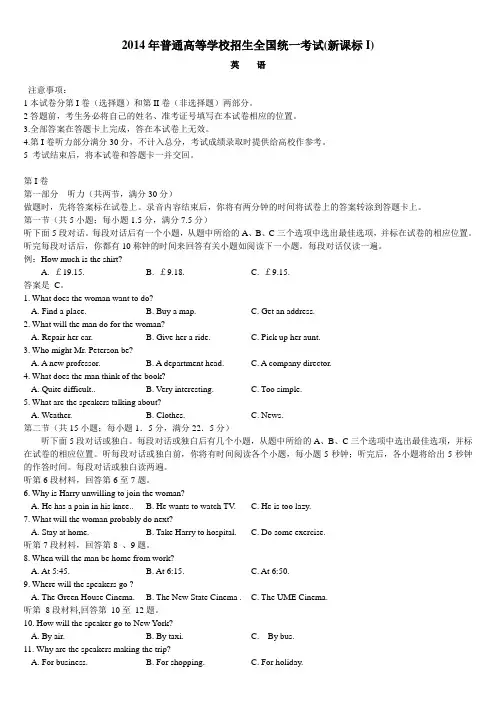
2014年普通高等学校招生全国统一考试(新课标I)英语注意事项:1本试卷分第I卷(选择题)和第II卷(非选择题)两部分。
2答题前,考生务必将自己的姓名、准考证号填写在本试卷相应的位置。
3.全部答案在答题卡上完成,答在本试卷上无效。
4.第I卷听力部分满分30分,不计入总分,考试成绩录取时提供给高校作参考。
5 考试结束后,将本试卷和答题卡一并交回。
第I卷第一部分听力(共两节,满分30分)做题时,先将答案标在试卷上。
录音内容结束后,你将有两分钟的时间将试卷上的答案转涂到答题卡上。
第一节(共5小题;每小题1.5分,满分7.5分)听下面5段对话。
每段对话后有一个小题,从题中所给的A、B、C三个选项中选出最佳选项,并标在试卷的相应位置。
听完每段对话后,你都有10称钟的时间来回答有关小题如阅读下一小题。
每段对话仅读一遍。
例:How much is the shirt?A. £19.15.B. £9.18.C. £9.15.答案是C。
1. What does the woman want to do?A. Find a place.B. Buy a map.C. Get an address.2. What will the man do for the woman?A. Repair her car.B. Give her a ride.C. Pick up her aunt.3. Who might Mr. Peterson be?A. A new professor.B. A department head.C. A company director.4. What does the man think of the book?A. Quite difficult..B. Very interesting.C. Too simple.5. What are the speakers talking about?A. Weather.B. Clothes.C. News.第二节(共15小题;每小题1.5分,满分22.5分)听下面5段对话或独白。
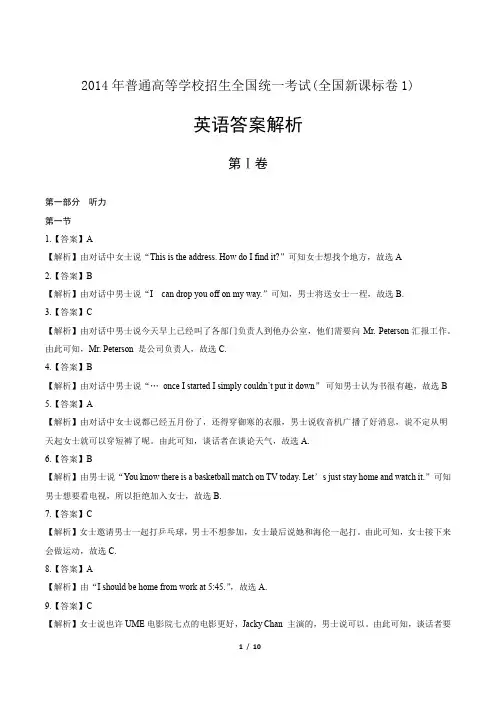
2014年普通高等学校招生全国统一考试(全国新课标卷1)英语答案解析第Ⅰ卷第一部分听力第一节1.【答案】A【解析】由对话中女士说“This is the address. How do I find it?”可知女士想找个地方,故选A2.【答案】B【解析】由对话中男士说“I can drop you off on my way.”可知,男士将送女士一程,故选B.3.【答案】C【解析】由对话中男士说今天早上已经叫了各部门负责人到他办公室,他们需要向Mr. Peterson汇报工作。
由此可知,Mr. Peterson 是公司负责人,故选C.4.【答案】B【解析】由对话中男士说“…once I started I simply couldn’t put it down”可知男士认为书很有趣,故选B 5.【答案】A【解析】由对话中女士说都已经五月份了,还得穿御寒的衣服,男士说收音机广播了好消息,说不定从明天起女士就可以穿短裤了呢。
由此可知,谈话者在谈论天气,故选A.6.【答案】B【解析】由男士说“You know there is a basketball match on TV today. Let’s just stay home and watch it.”可知男士想要看电视,所以拒绝加入女士,故选B.7.【答案】C【解析】女士邀请男士一起打乒乓球,男士不想参加,女士最后说她和海伦一起打。
由此可知,女士接下来会做运动,故选C.8.【答案】A【解析】由“I should be home from work at 5:45.”,故选A.9.【答案】C【解析】女士说也许UME电影院七点的电影更好,Jacky Chan 主演的,男士说可以。
由此可知,谈话者要去UME电影院,故选C.10.【答案】A【解析】由“So we're leaving on Monday from Hartsfield International Airport…”可知答案.故选C.11.【答案】A【解析】对话中女士说公司安排了车送他们到机场,并且公司负责这次旅行的费用。
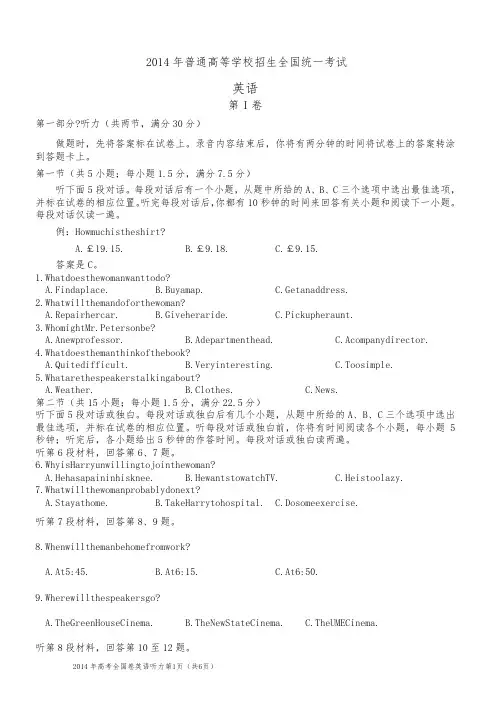
2014年普通高等学校招生全国统一考试英语第I卷第一部分?听力(共两节,满分30分)做题时,先将答案标在试卷上。
录音内容结束后,你将有两分钟的时间将试卷上的答案转涂到答题卡上。
第一节(共5小题;每小题1.5分,满分7.5分)5听第6听第7段材料,回答第8、9题。
8.Whenwillthemanbehomefromwork?A.At5:45.B.At6:15.C.At6:50.9.Wherewillthespeakersgo?A.TheGreenHouseCinema.B.TheNewStateCinema.C.TheUMECinema.听第8段材料,回答第10至12题。
10.HowwillthespeakersgotoNew York?A.Byair.B.Bytaxi.C.Bybus.11.Whyarethespeakersmakingthetrip????A.Forbusiness. B.Forshopping. C.Forholiday.12.Whatistheprobablerelationshipbetweenthespeakers?听第9听第18.Whatisthespeaker’sopiniononpublictransport?A.It’scomfortable.B.It’stime-saving.C.It’scheap.19.Whatisgoodaboutlivinginasmalltown?A.It’ssafer.B.It’shealthier.C.It’smoreconvenient.20.Whatkindoflifedoesthespeakerseemtolikemost?A.Busy.B.Colourful.C.Quiet.参考答案1—5ABCBA???????6-10BCACA????????11-15ACBCA???????16-20CBCAB录音原文Text1W:Excuseme.Thisistheaddress.HowdoIfindit?M:Well,there’ssomegoodnewsontheradio.Youprobablycanwearshortstomorrow.Text6W:Harry,let’splaysomeping-pongtoday.M:I’dlovetoplayasetortwo,butmyrightarmhurts.I’vedecidedtostopplayingping-ponguntil itfeelsbetter.W:Well,howaboutgoingskating?M:I’dliketo,butmykneehurts,too.W:Harry,stopmakingexcuses!You’rejustlazy.M:No,I’mnot!Youknow,there’sabasketballmatchonTVtoday.Let’sjuststayhomeandwatchit. W:OK.Youstay,andI’llplaywithHelen.Text7…M:OK.So,we’releavingonMondayfromHartsfield International Airport,andreturningonFriday.Dowetakeourselvestotheairport?Maybeweneedtobookataxi,or justgobybus.W:No,wedon’thaveto.Thecompanycarwillpickusupandtakeusthere.M:Oh,that’sgood.When?W:Ourflightleavesat11:00 a.m.,sotheyshouldpickusupbetween8:00and9:00a.m.Besides,thecompanypaysforourtrip,includinghotelandfood.M:Howmuchwillthatbe?W:Well,New Yorkisaprettyexpensivecity.So,eachofuswillget$200 aday.M:Oh,OK.Thanksfortellingmethat.W:You’rewelcome.…earfromussometimenextmonth.Goodluck!Andthanksforcomingintoday.Text10M:Well,I’dlovetosharewithyoumypersonalopinionsoncitylifeandlifeinsmalltowns.Igrewup inasmalltownuntilIwas18andthenmovedtoabigcity,soIhaveexperiencedthegoodandbadsidesof both.IneverthoughtthatIwouldlikelivinginabigcity,butIwaswrong.Aftertenyearsoflivingi none,Ican’timagineeverlivinginasmalltownagain.Surelysmalltownsandbigcitiesbothhavesomeproblemsintermsoftransport.Inasmalltown,youhavetoownacartomakelifecomfortable.You can’tgetaroundwithoutonebecausethereisn’tanykindofpublictransport.Bigcitiesgeneral lyhaveheavytrafficandexpensiveparking,butthereyouhaveachoiceoftakingpublictransport, whichischeaperthandriving.So,ifyoudon’thaveacar,you’dbetterliveinthecity.Ialsolove theexcitinglifeinbigcities.Icanalwaysenjoyalotoffilms,concerts,andotherwonderfulshow。
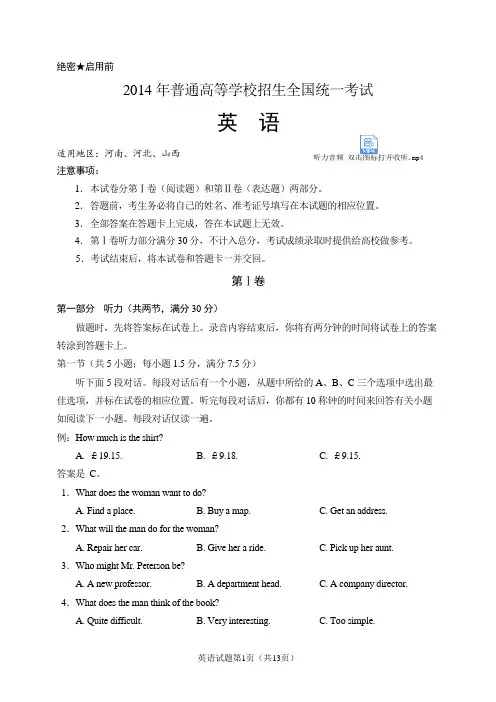
绝密★启用前2014年普通高等学校招生全国统一考试英语适用地区:河南、河北、山西听力音频 双击图标打开收听.mp4注意事项:1.本试卷分第Ⅰ卷(阅读题)和第Ⅱ卷(表达题)两部分。
2.答题前,考生务必将自己的姓名、准考证号填写在本试题的相应位置。
3.全部答案在答题卡上完成,答在本试题上无效。
4.第Ⅰ卷听力部分满分30分,不计入总分,考试成绩录取时提供给高校做参考。
5.考试结束后,将本试卷和答题卡一并交回。
第Ⅰ卷第一部分听力(共两节,满分30分)做题时,先将答案标在试卷上。
录音内容结束后,你将有两分钟的时间将试卷上的答案转涂到答题卡上。
第一节(共5小题;每小题1.5分,满分7.5分)听下面5段对话。
每段对话后有一个小题,从题中所给的A、B、C三个选项中选出最佳选项,并标在试卷的相应位置。
听完每段对话后,你都有10称钟的时间来回答有关小题如阅读下一小题。
每段对话仅读一遍。
例:How much is the shirt?A. £19.15.B. £9.18.C. £9.15.答案是C。
1.What does the woman want to do?A. Find a place.B. Buy a map.C. Get an address.2.What will the man do for the woman?A. Repair her car.B. Give her a ride.C. Pick up her aunt. 3.Who might Mr. Peterson be?A. A new professor.B. A department head.C. A company director. 4.What does the man think of the book?A. Quite difficult.B. Very interesting.C. Too simple.5.What are the speakers talking about?A. Weather.B. Clothes.C. News.第二节(共15小题:每小题1.5分,满分22.5分)听下面5段对话或独白。
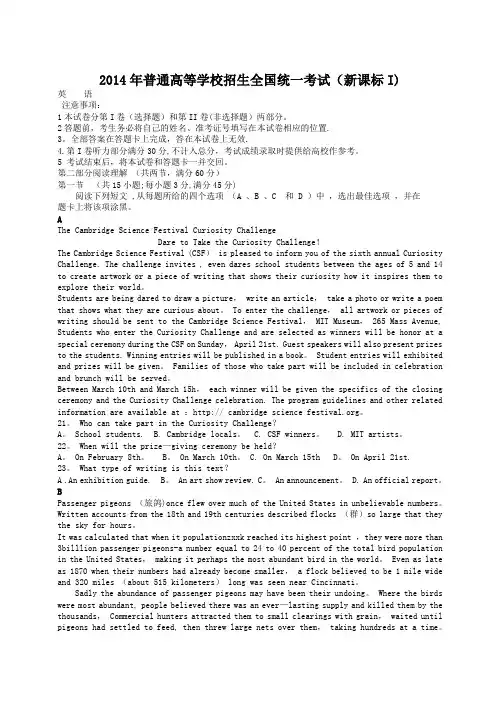
2014年普通高等学校招生全国统一考试(新课标I)英语注意事项:1本试卷分第I卷(选择题)和第II卷(非选择题)两部分。
2答题前,考生务必将自己的姓名、准考证号填写在本试卷相应的位置.3。
全部答案在答题卡上完成,答在本试卷上无效.4.第I卷听力部分满分30分,不计入总分,考试成绩录取时提供给高校作参考。
5 考试结束后,将本试卷和答题卡一并交回。
第二部分阅读理解(共两节,满分60分)第一节(共15小题;每小题3分,满分45分)阅读下列短文 ,从每题所给的四个选项(A 、B 、C 和 D )中,选出最佳选项,并在题卡上将该项涂黑。
AThe Cambridge Science Festival Curiosity ChallengeDare to Take the Curiosity Challenge!The Cambridge Science Festival (CSF) is pleased to inform you of the sixth annual Curiosity Challenge. The challenge invites , even dares school students between the ages of 5 and 14 to create artwork or a piece of writing that shows their curiosity how it inspires them to explore their world。
Students are being dared to draw a picture, write an article, take a photo or write a poem that shows what they are curious about。
To enter the challenge, all artwork or pieces of writing should be sent to the Cambridge Science Festival, MIT Museum, 265 Mass Avenue, Students who enter the Curiosity Challenge and are selected as winners will be honor at a special ceremony during the CSF on Sunday, April 21st. Guest speakers will also present prizes to the students. Winning entries will be published in a book。
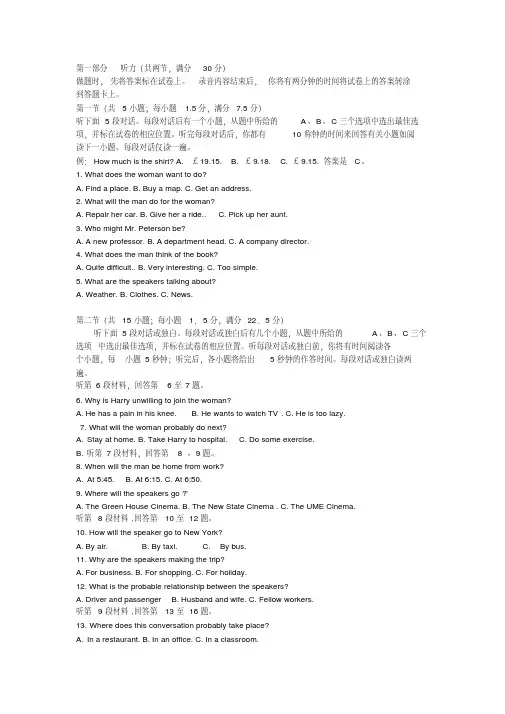
第一部分听力(共两节,满分30分)做题时,先将答案标在试卷上。
录音内容结束后,你将有两分钟的时间将试卷上的答案转涂到答题卡上。
第一节(共5小题;每小题 1.5分,满分7.5分)听下面5段对话。
每段对话后有一个小题,从题中所给的A、B、C三个选项中选出最佳选项,并标在试卷的相应位置。
听完每段对话后,你都有10称钟的时间来回答有关小题如阅读下一小题。
每段对话仅读一遍。
例:How much is the shirt? A. £19.15. B. £9.18. C. £9.15. 答案是C。
1. What does the woman want to do?A. Find a place.B. Buy a map.C. Get an address.2. What will the man do for the woman?A. Repair her car.B. Give her a ride..C. Pick up her aunt.3. Who might Mr. Peterson be?A. A new professor.B. A department head.C. A company director.4. What does the man think of the book?A. Quite difficult..B. Very interesting.C. Too simple.5. What are the speakers talking about?A. Weather.B. Clothes.C. News.第二节(共15小题;每小题1.5分,满分22.5分)听下面5段对话或独白。
每段对话或独白后有几个小题,从题中所给的A、B、C三个选项中选出最佳选项,并标在试卷的相应位置。
听每段对话或独白前,你将有时间阅读各个小题,每小题5秒钟;听完后,各小题将给出5秒钟的作答时间。
每段对话或独白读两遍。
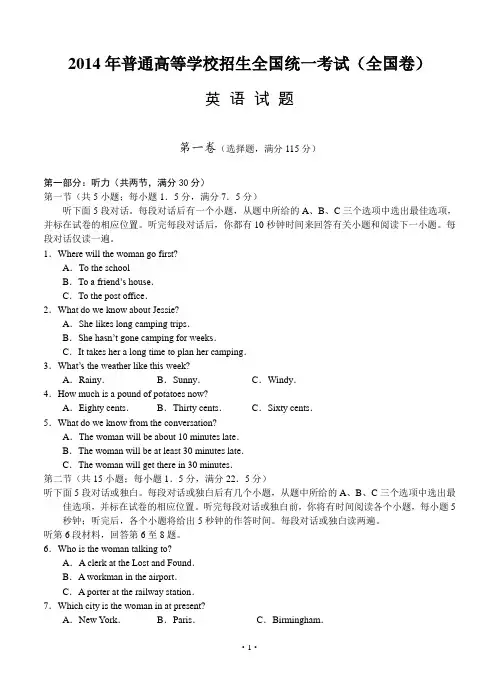
2014年普通高等学校招生全国统一考试(全国卷)英语试题第一卷(选择题,满分115分)第一部分:听力(共两节,满分30分)第一节(共5小题;每小题1.5分,满分7.5分)听下面5段对话。
每段对话后有一个小题,从题中所给的A、B、C三个选项中选出最佳选项,并标在试卷的相应位置。
听完每段对话后,你都有10秒钟时间来回答有关小题和阅读下一小题。
每段对话仅读一遍。
1.Where will the woman go first?A.To the schoolB.T o a friend’s house.C.To the post office.2.What do we know about Jessie?A.She likes long camping trips.B.She hasn’t gone camping for weeks.C.It takes her a long time to plan her camping.3.What’s the weather like this week?A.Rainy.B.Sunny.C.Windy.4.How much is a pound of potatoes now?A.Eighty cents.B.Thirty cents.C.Sixty cents.5.What do we know from the conversation?A.The woman will be about 10 minutes late.B.The woman will be at least 30 minutes late.C.The woman will get there in 30 minutes.第二节(共15小题;每小题1.5分,满分22.5分)听下面5段对话或独白。
每段对话或独白后有几个小题,从题中所给的A、B、C三个选项中选出最佳选项,并标在试卷的相应位置。
听完每段对话或独白前,你将有时间阅读各个小题,每小题5秒钟;听完后,各个小题将给出5秒钟的作答时间。
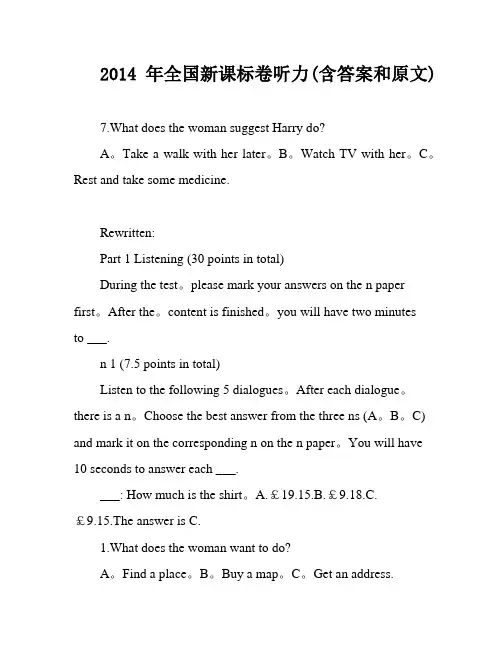
2014年全国新课标卷听力(含答案和原文)7.What does the woman suggest Harry do?A。
Take a walk with her later。
B。
Watch TV with her。
C。
Rest and take some medicine.Rewritten:Part 1 Listening (30 points in total)During the test。
please mark your answers on the n paper first。
After the。
content is finished。
you will have two minutesto ___.n 1 (7.5 points in total)Listen to the following 5 dialogues。
After each dialogue。
there is a n。
Choose the best answer from the three ns (A。
B。
C) and mark it on the corresponding n on the n paper。
You will have10 seconds to answer each ___.___: How much is the shirt。
A.£19.15.B.£9.18.C.£9.15.The answer is C.1.What does the woman want to do?A。
Find a place。
B。
Buy a map。
C。
Get an address.2.What will the man do for the woman?A。
Repair her car。
B。
Give her a ride。
C。
Pick up her aunt.3.Who might Mr。
Peterson be?___.4.What does the man think of the book?A。
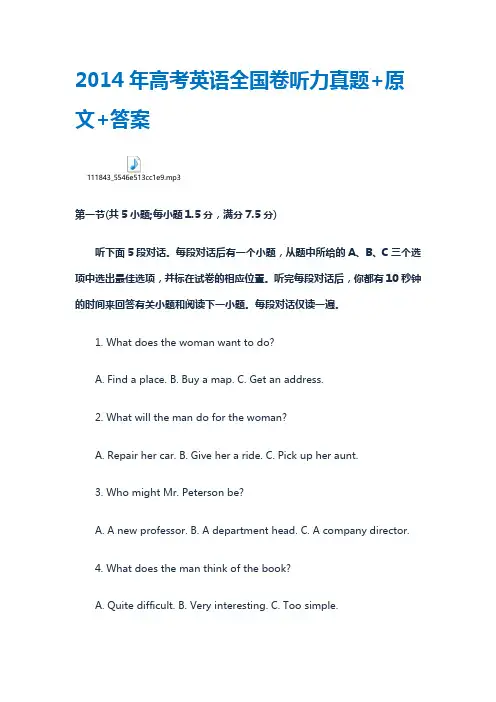
2014年高考英语全国卷听力真题+原文+答案111843_5546e513cc1e9.m p3第一节(共5小题;每小题1.5分,满分7.5分)听下面5段对话。
每段对话后有一个小题,从题中所给的A、B、C三个选项中选出最佳选项,并标在试卷的相应位置。
听完每段对话后,你都有10秒钟的时间来回答有关小题和阅读下一小题。
每段对话仅读一遍。
1. What does the woman want to do?A. Find a place.B. Buy a map.C. Get an address.2. What will the man do for the woman?A. Repair her car.B. Give her a ride.C. Pick up her aunt.3. Who might Mr. Peterson be?A. A new professor.B. A department head.C. A company director.4. What does the man think of the book?A. Quite difficult.B. Very interesting.C. Too simple.5. What are the speakers talking about?A. Weather.B. Clothes.C. News.第二节(共15小题;每小题1.5分,满分22.5分)听下面5段对话或独白。
每段对话或独白后有几个小题,从题中所给的A、B、C三个选项中选出最佳选项,并标在试卷的相应位置。
听每段对话或独白前,你将有时间阅读各个小题,每小题5秒钟;听完后,各小题给出5秒钟的作答时间。
每段对话或独白读两遍。
听第6段材料,回答第6、7题。
6. Why is Harry unwilling to join the woman?A. He has a pain in his knee.B. He wants to watch TV.C. He is too lazy.7. What will the woman probably do next?A. Stay at home.B. Take Harry to hospital.C. Do some exercise.听第7段材料,回答第8、9题。
2014年普通高等学校招生全国统一考试(全国卷)英语试题第一卷(选择题,满分115分)分)第一部分:听力(共两节,满分30分)分)第一节(共5小题;每小题1.5分,满分7.5分)听下面5段对话。
每段对话后有一个小题,从题中所给的A、B、C三个选项中选出最佳选项,并标在试卷的相应位置。
听完每段对话后,你都有10秒钟时间来回答有关小题和阅读下一小题。
每段对话仅读一遍。
段对话仅读一遍。
1.Where will the woman go first? A.To the school B.T o a friend’s house.C.To the post office.2.What do we know about Jessie? A.She likes long camping trips.B.She hasn’t gone camping for weeks.C.It takes her a long time to plan her camping.3.What’s the weather like this week?A.Rainy.B.Sunny.C.Windy.4.How much is a pound of potatoes now? A.Eighty cents.B.Thirty cents.C.Sixty cents.5.What do we know from the conversation? A.The woman will be about 10 minutes late.B.The woman will be at least 30 minutes late.C.The woman will get there in 30 minutes.分)第二节(共15小题;每小题1.5分,满分22.5分)听下面5段对话或独白。
每段对话或独白后有几个小题,从题中所给的A、B、C三个选项中选出最佳选项,并标在试卷的相应位置。
2014年普通高等学校招生全国统一考试(新课标I)英 语第I卷第一部分 听力(共两节,满分 分)做题时,先将答案标在试卷上。
录音内容结束后,你将有两分钟的时间将试卷上的答案转涂到答题卡上。
第一节(共 小题;每小题 分,满分 分)听下面 段对话。
每段对话后有一个小题,从题中所给的 、 、 三个选项中选出最佳选项,并标在试卷的相应位置。
听完每段对话后,你都有 称钟的时间来回答有关小题如阅读下一小题。
每段对话仅读一遍第二节(共 小题;每小题 . 分,满分 . 分)听下面 段对话或独白。
每段对话或独白后有几个小题,从题中所给的 、 、 三个选项中选出最佳选项,并标在试卷的相应位置。
听每段对话或独白前,你将有时间阅读各个小题,每小题 秒钟;听完后,各小题将给出 秒钟的作答时间。
每段对话或独白读两遍。
听第 段材料,回答第 至 题。
听第 段材料,回答第 、 题。
听第 段材料 回答第 至 题。
听第 段材料 回答第 至 题。
听第 段材料,回答第 至 题。
第二部分阅读理解 (共两节,满分 分)第一节 (共 小题 每小题 分,满分 分)阅读下列短文 ,从每题所给的四个选项 ( 、 、 和 )中 ,选出最佳选项 ,并在题卡上将该项涂黑。
旅鸽群驱散(驯兽师) 鞭第二节(共 小题;每小题 分,满分 分)根据短文内容,从短文后的选项中选出能填入空白处的最佳选项。
选项中有两项为多余选项。
配料第三部分英语知识运用(共两节,满分 分)第一节完形填空(共 小题;每小题 分,满分 分)阅读下面短文,从短文后各题所给的四个选项( 、 、 和 )中,选出可以填人空白处的最佳选项,并在答题卡上将该项涂黑。
常规 抱怨 执照第 卷注意事项:用 毫米黑色笔迹的签字笔将答案写在答题卡上。
写在本试卷上无效。
第三部分 英语知识运用(共两节,满分 分)第二节(共 小题;每小题 分,满分 分)阅读下面材料,在空白处填入适当的内容(不多于 个单词)或括号内单词的正确形式。
2014年普通高等学校招生全国统一考试(新课标I)英语第I卷第一部分听力(共两节,满分30分)做题时,先将答案标在试卷上。
录音内容结束后,你将有两分钟的时间将试卷上的答案转涂到答题卡上。
第一节(共5小题;每小题1.5分,满分7.5分)听下面5段对话。
每段对话后有一个小题,从题中所给的A、B、C三个选项中选出最佳选项,并标在试卷的相应位置。
听完每段对话后,你都有10称钟的时间来回答有关小题如阅读下一小题。
每段对话仅读一遍。
1. What does the woman want to do?A. Find a place.B. Buy a map.C. Get an address.2. What will the man do for the woman?A. Repair her car.B. Give her a ride..C. Pick up her aunt.3. Who might Mr. Peterson be?A. A new professor.B. A department head.C. A company director.4. What does the man think of the book?A. Quite difficult.B. Very interesting.C. Too simple.5. What are the speakers talking about?A. Weather.B. Clothes.C. News.第二节(共15小题;每小题1.5分,满分22.5分)听下面5段对话或独白。
每段对话或独白后有几个小题,从题中所给的A、B、C三个选项中选出最佳选项,并标在试卷的相应位置。
听每段对话或独白前,你将有时间阅读各个小题,每小题5秒钟;听完后,各小题将给出5秒钟的作答时间。
每段对话或独白读两遍。
听第6段材料,回答第6至7题。
6. Why is Harry unwilling to join the woman?A. He has a pain in his knee..B. He wants to watch TVC. He is too lazy.7. What will the woman probably do next?A. Stay at home.B. Take Harry to hospital.C. Do some exercise.听第7段材料,回答第8 、9题。
We are going to take one of the most important exams in China and I am going to talk about one important part of the exam. That part is listening.2014年普通高等学校招生全国统一考试英语第I卷第一部分听力(共两节,满分30分)做题时,先将答案标在试卷上。
录音内容结束后,你将有两分钟的时间将试卷上的答案转涂到答题卡上。
第一节(共5小题;每小题1.5分,满分7.5分)听下面5段对话。
每段对话后有一个小题,从题中所给的A、B、C三个选项中选出最佳选项,并标在试卷的相应位置。
听完每段对话后,你都有10秒钟的时间来回答有关小题和阅读下一小题。
每段对话仅读一遍。
例:How much is the shirt?A. £19.15.B. £9.18.C. £9.15.答案是C。
1. What does the woman want to do?A. Find a place.B. Buy a map.C. Get an address.2. What will the man do for the woman?A. Repair her car.B. Give her a ride.C. Pick up her aunt.3. Who might Mr. Peterson be?A. A new professor.B. A department head.C. A company director.4. What does the man think of the book?A. Quite difficult.B. Very interesting.C. Too simple.5. What are the speakers talking about?A. Weather.B. Clothes.C. News.第二节(共15小题;每小题1.5分,满分22.5分)听下面5段对话或独白。
2014高考英语全国I卷听力试题及录音原文(音频下载+参考答案)2014高考英语全国I卷听力试题第一部分听力(共两节,满分30分)1. What does the woman want to do?A. Find a place.B. Buy a map.C. Get an address.2. What will the man do for the woman?A. Repair her car.B. Give her a ride..C. Pick up her aunt.3. Who might Mr. Peterson be?A. A new professor.B. A department head.C. A company director.4. What does the man think of the book?A. Quite difficult..B. Very interesting.C. Too simple.5. What are the speakers talking about?A. Weather.B. Clothes.C. News.第二节(共15小题;每小题1.5分,满分22.5分)听第6段材料,回答第6至7题。
6. Why is Harry unwilling to join the woman?A. He has a pain in his knee..B. He wants to watch TV.C. He is too lazy.7. What will the woman probably do next?A. Stay at home.B. Take Harry to hospital.C. Do some exercise.听第7段材料,回答第8 、9题。
8. When will the man be home from work?A. At 5:45.B. At 6:15.C. At 6:50.9. Where will the speakers go ?'A. The Green House Cinema.B. The New State Cinema .C. The UME Cinema.听第8段材料,回答第10至12题。
2014 年全国高考英语听力试题暨听力原文第一部分听力(共两节,满分30 分)第一节(共5小题;每小题1.5分,满分7.5 分)听下面5 段对话。
每段对话后有一个小题,从题中所给的佳选项,并标在试卷的相应位置。
听完每段对话后,你都有和阅读下一小题。
每段对话仅读一遍。
1. What does the woman want to do?A. Find a place.B. Buy a map.2. What will the man do for the woman?A. Repair her car.B. Give her a ride.3. Who might Mr. Peterson be?A. A new professor.B. A department head.4. What does the man think of the book?A. Quite difficult.B. Very interesting.5. What are the speakers talking about?A. Weather.B. Clothes.第二节(共15 小题;每小题1.5 分,满分22.5 分)听下面5 段对话或独白。
每段对话或独白后有几个小题,从题中所给的A、B、C 三个选项中选出最佳选项,并标在试卷的相应位置。
听每段对话或独白前,你将有时间阅读各个小题,每小题5 秒钟;听完后,各小题给出5 秒钟的作答时间。
每段对话或独白读两遍。
听第6 段材料,回答第6、7 题。
6. Why is Harry unwilling to join the woman?A. He has a pain in his knee.B. He wants to watch TV.7. What will the woman probably do next?A. Stay at home.B. Take Harry to hospital.听第7 段材料,回答第8、9 题。
2014高考英语全国I卷听力试题第一部分听力(共两节,满分30分)1. What does the woman want to do?A. Find a place.B. Buy a map.C. Get an address.2. What will the man do for the woman?A. Repair her car.B. Give her a ride..C. Pick up her aunt.3. Who might Mr. Peterson be?A. A new professor.B. A department head.C. A company director.4. What does the man think of the book?A. Quite difficult..B. Very interesting.C. Too simple.5. What are the speakers talking about?A. Weather.B. Clothes.C. News.第二节(共15小题;每小题1.5分,满分22.5分)听第6段材料,回答第6至7题。
6. Why is Harry unwilling to join the woman?A. He has a pain in his knee..B. He wants to watch TV.C. He is too lazy.7. What will the woman probably do next?A. Stay at home.B. Take Harry to hospital.C. Do some exercise.听第7段材料,回答第8 、9题。
8. When will the man be home from work?A. At 5:45.B. At 6:15.C. At 6:50.9. Where will the speakers go ?'A. The Green House Cinema.B. The New State Cinema .C. The UME Cinema.听第8段材料,回答第10至12题。
10. How will the speaker go to New York?A. By air.B. By taxi.C. By bus.11. Why are the speakers making the trip?A. For business.B. For shopping.C. For holiday.12. What is the probable relationship between the speakers?A. Driver and passengerB. Husband and wife.听第9段材料,回答第13至16题。
13. Where does this conversation probably take place?A. In a restaurant.B. In an office.C. In a classroom.14. What does John do now?A. He’s a trainer.B. He’s a tour guid e.C. He’s a college student.15. How much can a new person earn for the first year?A. $10,500.B. $ 12,000.C. $ 15,000.16. How many people will the woman hire?A. Four.B. Three.C. Two.听第10段材料,回答第17至20题。
17. How long has the speaker lived in a big city?A. One year.B. Ten years.C. Eighteen years.18. What is the speaker’s opinion on public transport?A. It’s comfortable.B. It’s time-saving.C. It’s cheap.19. What is good about living in a small town?A. It’s safer.B. It’s healthier.C. It’s more convenient.20. What kind of life does the speaker seem to like most?A. Busy.B. ColourfulC. Quiet.参考答案1-5 ABCBA6-10 BCACA11-15 ACBCA16-20 CBCAB音频MP3下载链接:https:///s/1oOxmO3SQ6frnsUg79hL45A提取码:dwmv复制这段内容后打开百度网盘手机App,操作更方便听力原文Text 1W: Excuse me. This is the address. How do I find it?M: Right. You'll need a street map. Here's one, andI'll show you where it is.Text 2W: Oh my! My car broke down, and I have to meetmy aunt at the railway station before noon.M: You're lucky. I can drop you off on my way.Text 3W: Did you hear that Mr. Peterson is coming next week, Gordon?M: Yes, so I called all the department heads to my office this morning. We need to give him reports on our program.Text 4W: I hope you like the book I lent you. I wasn't sure if you'd be interested.M: I had the same doubt at first. But once I started, I simply couldn't put it down.Text 5W: What is going on? It's May, and we still have to wear warm clothes.M: Well, there's some good news on the radio. You probably can wear shorts tomorrow.Text 6W: Harry, let's play some ping-pong today.M: I'd love to play a set or two, but my right arm hurts. I've decided to stop playing ping-ponguntil it feels better.W: Well, how about going skating?M: I'd like to, but my knee hurts, too.W: Harry, stop making excuses! You're just lazy.M: No, I'm not! You know, there's a basketball match on TV today. Let's just stay home and watch it.W: OK. You stay, and I'll play with Helen.Text 7W: What do you want to do tonight?M: How about going to the cinema? I should be home from work at 5:45. Then we can go outand eat before we see a film.W: What do you want to see?M: There's a good art film at the Green House Cinema.W: Let's see…it starts at 6:15. I don't think we can get there in time to see the beginning. How about the action film at the New State Cinema? It starts at 6:50. Perhaps the 7:00 one at theUME Cinema is even better. It stars Jackie Chan.M: OK, that's fine. I like him, too.Text 8M: Hey, Lucy. Do you have some time to talk about next week's trip with me?W: Sure, Dave.M: OK. So, we're leaving on Monday from Hartsfield International Airport, and returning on Friday. Do we take ourselves to the airport? Maybe we need to book a taxi, or just go by bus.W: No, we don't have to. The company car will pick us up and take us there.M: Oh, that's good. When?W: Our flight leaves at 11:00 a.m., so they should pick us up between 8:00 and 9:00 a.m. Besides, the company pays for our trip, including hotel and food.M: How much will that be?W: Well, New York is a pretty expensive city. So, each of us will get $200 a day.M: Oh, OK. Thanks for telling me that.W: You're welcome.Text 9W: Please sit down. Let's see…you're Mr. Smith. Is that correct?M: Yes. John Smith.W: And you're interested in this job?M: Yes, I am. I'll graduate from college the coming June. My major is Chinese.W: I see. Have you ever done any work in this field?M: Yes, I used to be a tour guide for Chinese travelers.W: Good. Now, how much money do you expect to have for a year?M: From what I've read, it seems that a starting pay would be around $12,000 a year.W: Here, you would start at $10,500 for the first year…a kind of training period. Then you would go to $15,000.M: That sounds fair enough. What do you think are the chances for me to get a job here?W: Well, I'm talking to three people today and four tomorrow. We'll be hiring two people. You’ll hear from us sometime next month. Good luck! And thanks for coming in today.Text 10M: Well, I'd love to share with you my personal opinions on city life and life in small towns. I grew up in a small town until I was 18 and then moved to a big city, so I have experienced the good and bad sides of both. I never thought that I would like living in a big city, but I was wrong. After ten years of living in one, I can't imagine ever living in a small town again. Surely small towns and big cities both have some problems in terms of transport. In a small town, you have to own a car to make life comfortable. You can't get around without one because there isn't any kind of public transport. Big cities generally have heavy traffic and expensive parking, but there you have a choice of taking public transport, which is cheaper than driving. So, if you don't have a car, you'd better live in the city. I also love the exciting life in big cities. Ican always enjoy a lot of films, concerts, and other wonderful shows. However, these things arenot common in small towns. The final thing I like about large cities is that you can meet different kinds of people. However, you seldom find such a variety of people in a smaller town. I think that living in an area where everyone was just like me would quickly become dull. Of course, safety should be considered, and that's one area where small towns are better than big cities. Still, I would rather be a bit more careful and live in a large city than to feel safe but dull.。